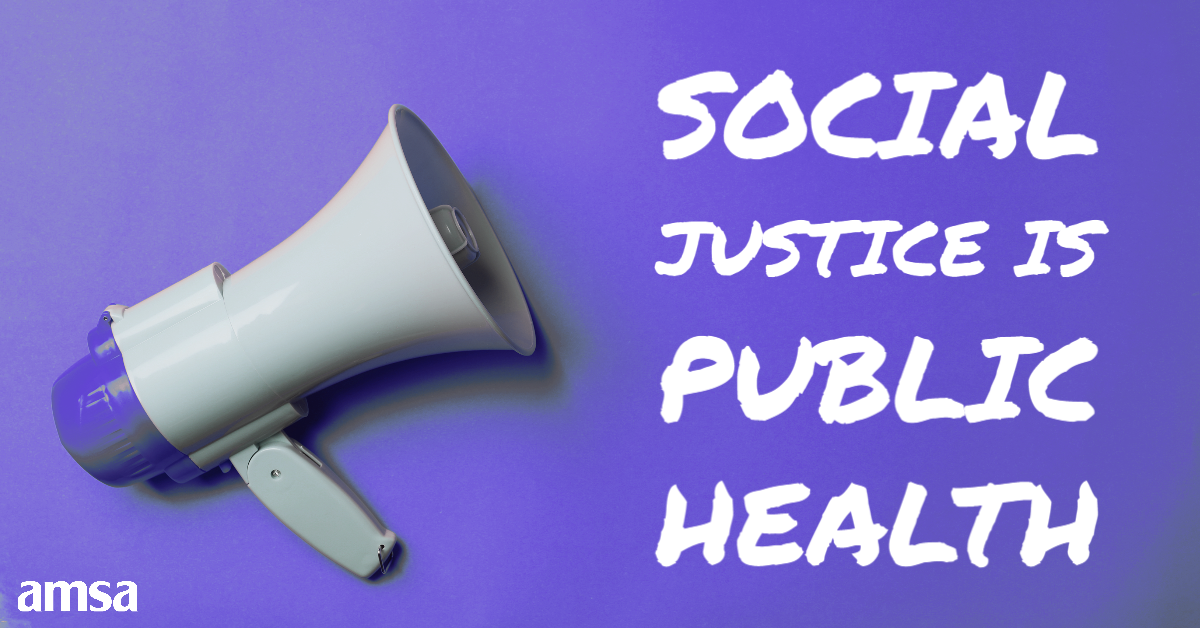If You’re a Physician, You’re an Activist
“It’s inherently the duty of anyone who’s going into the health care field to be an activist, not just for yourself but for your patients,” says youth activist, proud Latina, and future physician Daphne Frias. “I think if you’re going into the health care field, and you don’t understand the intrinsic layers of oppression that your patients are coming to you with, there’s some level of disservice that’s being had. Because all of us can attest to the fact that there are so many layers of trauma that patients can come to us with.”
Consider the COVID-19 pandemic and how it has put a spotlight on the intersections between public health and social justice. “Does the health care system work for people and is it made for them? When you come down with something, do you feel like you have a reliable place to go and get better? For a lot of people, that isn’t the case,” said Frias.
Frias started organizing communities as a college student. Shortly after the Parkland High School shooting, she arranged busing for more than 100 students from campus to a nearby March For Our Lives (MFOL) event. She has since worked as the NY State Director for March For Our Lives, as an elected official representing West Harlem, New York City, where she was born and raised, an outreach director of SafeBAE, and more.
Frias shared her views on public health and social justice with AMSA members as part of AMSA’s Activism Update speaking series.
Social Justice is Public Health
Social justice and public health are intrinsically related. Frias engages in activism that’s related to making the intersections clear to communities and public officials. It should be normal, she said, to bring up gun violence, the climate crisis, and other social justice issues in conversations about public health.
“If we can look at violence similarly to how infectious diseases spread through our communities, we can have a great chance at ending violence and systemic oppressions that lead to that violence,” she said.
Frias described a trip to Flint, Mich., where she toured several schools affected by the water crisis. She heard stories over and over from students about going hungry because they were rationing bottled water for drinking and cooking. She heard stories of students suffering PTSD. She heard stories of students who struggled, for all these reasons, to stay focused in school. As a barrier to education and other opportunities, the public health crisis in Flint is undoubtedly a social justice issue.
That’s why Frias doesn’t sees her role as activist and health care professional as one and the same. “I think, for me, the moral of the story is, whether you know it or not, every day as health care professionals, we are intrinsically activists for our patients and for the communities that we’re working in and are fighting for,” she said. “I think it’s also important as we progress further into our health care careers, as we move around for residencies and fellowships, as we find ourselves in new communities, that we learn about those communities, learn about what their needs are before we arrive there, learn what their make-up is and what communities are hurting the most and how we can do something about it.”
From Personal Experience to Community Activism
Part of Frias’ passion for helping communities achieve social justice is rooted in personal experience. Born with Cerebral Palsy, she describes growing up in a world that is inherently ableist. She experienced the ways in which society fails to create spaces for the differently abled to succeed, hold positions of leadership, and thrive in general. She said: “And that was never okay with me.”
As someone who spent a lot of time in hospitals, Frias experienced firsthand the way social justice and health care converge (or fail to). “I oftentimes felt like I wasn’t anything more than just some words on a chart, and that my disability and my illness equated to all of who I was and that my life wasn’t any more than those things,” she said.
“It was those negative experience that led me to ask what is the responsibility of our health care system to our patients? How can we make sure our medical system is consistently more patient-centered and focused and less reliant on diagnoses and things of that nature? Beyond diagnoses are real humans with feelings and emotions that play into the psychological mindset of what it’s like to be a patient and what it’s like to go through a lengthy healing process.”
The above post is a summary of the session, you can also read the full transcript here.
About AMSA Activism Updates
AMSA Activism Updates this year led by our 2020 AMSA-KP Education and Advocacy Fellow, Mattie Renn, with the support of our leaders across all of the various AMSA Action Committees and Campaigns. Join us for panels, Q&As, and just enlightening discussion around the topics that AMSA is working on this year—at the intersection of medical education reform, civic engagement, COVID-19, and health justice, equity and access.

